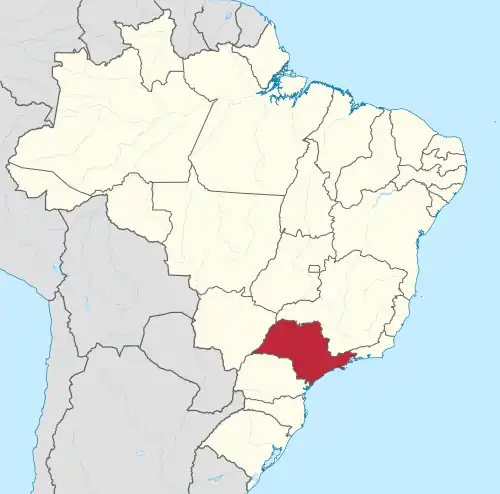LGBT rights in São Paulo (state)
Lesbian, gay, bisexual and transgender rights in the Brazilian state of São Paulo are liberal. Same-sex marriage is legally performed in the state, as in Brazil as a whole.
LGBT rights in São Paulo | |
|---|---|
 | |
| Status | Legal since 1830,[1] age of consent equalised |
| Gender identity | Gender change allowed,[2] official standard for altering legal sex doesn't require surgery since 2018 |
| Military | Allowed to serve openly[3] |
| Discrimination protections | Since 2019 |
| Family rights | |
| Recognition of relationships | Same-sex marriage legal nationwide since 2013[4][5] |
| Adoption | Legal since 2010[6] |
Laws against homosexuality
Homosexuality is legal in São Paulo State.
Hate crimes and discrimination law
The São Paulo Law No. 10 948 went into effect on 5 November 2001, providing for penalties to be applied to the practice of discrimination on grounds of sexual orientation and other measures.[7][8][9]
LGBT adoption
In 2006, a male gay couple from Catanduva, São Paulo officially adopted a five-year-old girl.[10]
Same-sex marriage
On December 18, 2012, the Justice Court of São Paulo state ordered all notaries statewide to open marriages licenses for same-sex couples, becoming the most populous Brazilian state to offer same-sex marriages in a manner that is equal to other marriages.[11]
LGBT life
Cultural expression
According to the Guinness World Records, the São Paulo Gay Pride Parade is the world's largest LGBT Pride celebration, with 4 million people in 2009.[12] In 2007, in its eleventh edition, the São Paulo Gay Pride Parade broke its own record as the biggest parade in the world and attracted 3.5 million people.[13]
Rights advocacy
SOMOS, an LGBT rights organization, was established in 1980 in São Paulo, at the same time as Grupo Gay da Bahia was established in Bahia.
Homophobia
In 2005, the Latin American Center of Human Rights in Sexuality (Clam) interviewed participants in the São Paulo Gay Pride Parade and found that 65% of their respondents had experienced hate speech and/or suffered physical aggression.
The Richarlyson affair occurred in which a judge was brought before the Justice Council of São Paulo for stating in court that soccer is a "virile, masculine sport and not a homosexual one." However, afterwards the same judge apologized and afterwards decided to annul the decision he wrote.[14]
References
- 16 December 1830 Law (in Portuguese)
- Changing legal gender assignment in Brazil (in Portuguese)
- Gays and Lesbians allowed to serve openly in the Brazilian Military Archived October 5, 2011, at the Wayback Machine (in Portuguese)
- "Portal CNJ - CNJ determina que cartórios terão de reconhecer união de pessoas do mesmo sexo". Archived from the original on June 15, 2013. Retrieved May 14, 2013.
- "Brazilian judicial council orders notaries to recognize same-sex marriage". CNN. May 15, 2013.
- Adoption of same-sex unions in Brazil (in Portuguese)
- Leis antidiscriminatórias no Brasil (Anti-homophobia laws in Brazil) Archived 2015-07-15 at the Wayback Machine (in Portuguese)
- Laws – Sexual Orientation (in Portuguese) Archived 2012-03-05 at the Wayback Machine
- Laws – Sexual orientation by Location (in Portuguese) Archived 2012-03-05 at the Wayback Machine
- Cartórios de SP aceitam registro de união gay". Baptista, Renata. Folha de S. Paulo. November 23, 2006. (in Portuguese)
- Casamento gay em São Paulo/Same-sex marriage in São Paulo state (in Portuguese)
- São Paulo Gay Parade (in English)
- São Paulo Gay Pride Parade. Folha de S. Paulo. June 10, 2007. (in Portuguese)
- Em programa de TV, Richarlyson nega ser homossexual (in Portuguese)

.svg.png.webp)